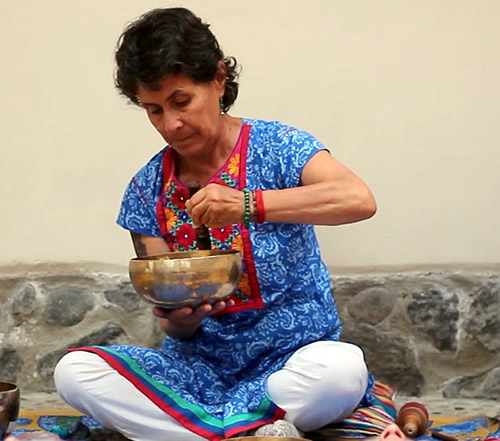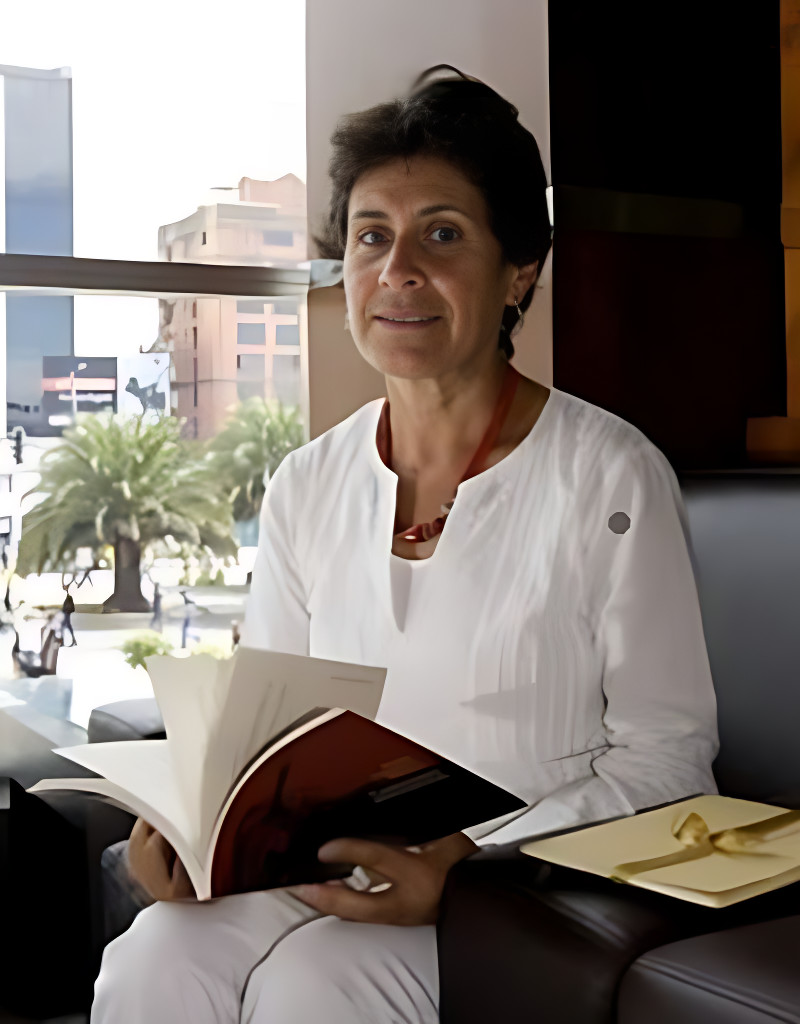Jennie Carrasco Molina (Ambato, 1955) is an Ecuadorian novelist, short story writer, poet, journalist, editor, university professor and holistic therapist. She has worked with the press and on women’s issues. Her works include the short story collection “La diosa en el espejo” (1995), the poetry collection “Arañas en mi vestido de seda” (2001), and the novel “Viaje a ninguna parte” (2004). In 2011 her poetry collection “Confesiones apocalípticas” won the prestigious Jorge Carrera Andrade Prize. Some of her poems have been translated into English.
Early Life and Education
Jennie Yolanda Carrasco Molina was born in 1955 in Ambato, Ecuador, a city renowned for its volcanic activity and vibrant cultural landscape. She attended La Providencia for her primary education and later graduated from Colegio La Inmaculada in secondary school. She pursued higher education at the Faculty of Journalism of the Central University of Ecuador, which paved the way for her multifaceted career as a writer, journalist, and educator.
Literary Career
Carrasco’s literary career began in the 1980s when she joined the La Pequeña Lulupa literature workshop, a formative experience that fostered her growth as a writer. Over the years, she established herself as a versatile writer, producing novels, short stories, poetry collections, and journalistic articles. Her work often explores feminist themes, personal identity, and societal issues, with a distinct focus on the Ecuadorian experience.
In addition to her literary output, Carrasco has worked extensively in journalism, contributing to renowned Ecuadorian magazines such as Letras del Ecuador, Palabra Suelta, and Eskeletra. Her storytelling, whether through prose or poetry, often reflects her deep connection to her homeland, its culture, and the role of women in society.
One of Carrasco’s most notable achievements came in 2011, when her poetry collection “Confesiones apocalípticas” earned the prestigious Jorge Carrera Andrade Prize, one of Ecuador’s top literary awards. Many of her works have also been included in anthologies, such as Voices from the Center of the World, Contemporary Poets of Ecuador, which features English translations of her poems.
Her involvement in women’s issues and feminist literature is also notable. She won the First Contest for ‘The Ecuadorian Feminist Story’ Prize in 1987, reflecting her long-standing engagement with themes of gender and social justice in her writing.
Awards and Recognitions
Jennie Carrasco Molina’s literary achievements have been recognized with numerous prestigious awards throughout her career, underscoring her impact on Ecuadorian literature and journalism. Her accolades span multiple decades, reflecting her sustained creative output and her contributions to feminist literature, poetry, and journalism. Below is a deeper exploration of her key awards and recognitions.
Early Recognition: Intercollegiate Awards
Carrasco’s first recognitions came early in her life, while she was still a student. She won the Intercollegiate Short Story Prize in 1972, awarded in Tungurahua, her home province. This early accolade marked the beginning of her journey into professional writing. Just a year later, in 1973, she won the Intercollegiate Essay Prize in Ambato. These awards demonstrated her versatility as a writer, excelling in both fiction and non-fiction, and foreshadowed her future contributions to Ecuadorian literature.
Feminist Literature: Ecuadorian Feminist Story Award (1987)
One of the most defining moments in Carrasco’s career came in 1987 when she won the First Contest for ‘The Ecuadorian Feminist Story’ Prize. This award recognized her commitment to exploring the complexities of female identity and the struggles women face in Ecuadorian society. Her focus on feminist themes continued to shape her work, and this prize solidified her status as a pioneering voice in Ecuadorian feminist literature. This early recognition of her feminist storytelling laid the foundation for her continued engagement with gender and social justice issues throughout her career.
Journalism: News Report Contest (1991)
Carrasco’s talents were not confined to fiction and poetry; she was also a dedicated journalist. In 1991, she won the News Report Contest organized by El Comercio, one of Ecuador’s most prominent newspapers. Her success in this contest highlighted her skills in investigative journalism and her ability to address important social issues in the press. This recognition not only bolstered her reputation as a journalist but also reflected her broader engagement with public discourse and cultural criticism.
Cultural Contributions: ‘Women, Images and Testimonies’ (1998)
In 1998, Carrasco was awarded for her participation in the Contest ‘Women, Images and Testimonies’, which focused on capturing the lived experiences of women through various forms of expression. This recognition reinforced her ongoing commitment to documenting and exploring the role of women in Ecuadorian culture, both in her creative works and in her broader social engagements. The prize reflected her ability to use literature as a means of giving voice to women’s stories, furthering her legacy as a feminist writer.
Poetry: Floral Games Biennial Poetry Contest (2006)
Carrasco’s prowess as a poet was recognized at the Floral Games Biennial Poetry Contest in 2006, organized by the Casa de la Cultura Núcleo de Tungurahua, where she earned second place. This contest is a significant cultural event in Ecuador, and her placement among the winners showcased her ability to craft evocative poetry that resonated with both critics and audiences. This award added to her growing reputation as one of Ecuador’s most important poets, and it preceded her eventual triumph in the Jorge Carrera Andrade Prize.
Major Literary Recognition: Jorge Carrera Andrade Poetry Prize (2011)
The most significant recognition of Carrasco’s career came in 2011 when she won the prestigious Jorge Carrera Andrade Poetry Prize for her collection “Confesiones apocalípticas”. Named after one of Ecuador’s most renowned poets, this prize is among the highest literary honors in the country and is awarded to writers whose work demonstrates exceptional literary merit. “Confesiones apocalípticas” deals with themes of personal and societal collapse, presenting a dark and introspective journey through poetry. This award not only affirmed Carrasco’s standing as a leading poet in Ecuador but also brought her work to a wider national and international audience. The Jorge Carrera Andrade Prize serves as a testament to the depth and relevance of her poetic voice.
Broader Literary Impact
In addition to these specific awards, Carrasco’s work has been featured in various anthologies that further solidify her status as a key figure in Ecuadorian literature. Notably, she has been included in anthologies such as “Poesía erótica de mujeres: Antología del Ecuador” (2001) and “Antología del cuento feminista latinoamericano” (1987), reflecting her contributions to feminist literature on a regional and international scale. In 2020, her work was included in the English-language anthology “Voices from the Center of the World: Contemporary Poets of Ecuador”, translated by Margaret Randall, bringing her poetry to an even broader readership.
Personal Life and Interests
Aside from her literary and journalistic pursuits, Carrasco is a certified holistic therapist and healer, specializing in Gestalt therapy and the creative process. She has led workshops focused on creativity, identity, and self-esteem, integrating therapeutic techniques with her literary background. This synthesis of holistic therapy and creative expression is a distinctive aspect of her career, allowing her to mentor others in personal and artistic development.
Carrasco currently resides in Quito, Ecuador, where she continues her work in editing, teaching creative writing workshops, and practicing holistic therapy. She is also a mother of two and a proud grandmother.
Themes and Contributions
Carrasco’s writing frequently explores themes of feminism, cultural identity, and personal transformation. Her works often center on women’s experiences, societal constraints, and the intersection of personal and collective histories. Books such as “Mujeres en la historia del Ecuador”, co-authored in 2009, reflect her commitment to highlighting the roles of women in Ecuadorian culture and history. Her novels and short stories, such as “Viaje a ninguna parte” and “La diosa en el espejo”, emphasize personal journeys of self-discovery and resilience.
She is also known for contributing to significant anthologies of Ecuadorian and Latin American literature. Notably, her work has been featured in “Poesía erótica de mujeres: Antología del Ecuador”, “Antología del cuento feminista latinoamericano”, and “Voices from the Center of the World”, which brings contemporary Ecuadorian poetry to a global audience.
Video
Jennie Carrasco interview
List of Awards
- Intercollegiate Short Story Prize, Tungurahua (1972)
- Intercollegiate Essay Prize, Ambato (1973)
- First Contest ‘The Ecuadorian feminist story’ prize (1987)
- News Report Contest of El Comercio (1991)
- Contest ‘Women, images and testimonies’ (1998)
- Second place in the Floral Games Biennial Poetry Contest, 2006, Casa de la Cultura Núcleo de Tungurahua.
- Jorge Carrera Andrade Poetry Prize for her book “Confesiones apocalípticas” (2011).
Education
- La Providencia (primary school)
- Colegio la Inmaculada (secondary school)
- Faculty of Journalist of the Central University of Ecuador (college)
Pictures

Works
- La diosa en el espejo (1995; short stories)
- Arañas en mi vestido de seda (2001; poetry)
- Viaje a ninguna parte (2004; novel)
- Cuentos de ceniza (2006; short stories)
- De diosas, guerreras y mujeres (2006; poetry)
- Una vuelta más abuela
- Del infierno al paraíso
- De noche el negro sueño
- Confesiones apocalípticas (2011; poetry)
- Amor distorsionado
- Espíritu jaguar (2017; novel)
- Rumiñahui y sus parroquias: cultura, tradición y progreso (2017; culture, nonfiction)
A partial list of Anthologies in which her poems have been included
- Poesía erótica de mujeres: Antología del Ecuador (2001)
- Antología del cuento feminista latinoamericano (Chile, 1987)
- Toros en el corazon: Antologia de poesia eskeletra (1997)
- Antología básica del cuento ecuatoriano (1998)
- Voices from the Center of the World, Contemporary Poets of Ecuador (2020) with English translation by Margaret Randall. Preview it for free here.
References
- Blogger, “Profile: Jennie Carrasco Molina.” Retrieved on October 4, 2024. Click to view.
- Goodreads, “Jennie Carrasco Molina.” Retrieved on October 4, 2024. Click to view.
- Open Library, “Mujeres en la historia del Ecuador.” Retrieved on October 4, 2024. Click to view.
- Google Books, “Jennie Carrasco Molina – Search Results.” Retrieved on October 4, 2024. Click to view.
- El Comercio, “Murciélagario: Jennie Carrasco.” Retrieved on October 4, 2024. Click to view.
- Biblioteca Nacional del Ecuador, “Jennie Carrasco Molina.” Retrieved on October 4, 2024. Click to view.

